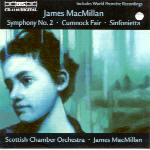While the music of Scottish composer James MacMillan (b. 1959) shows the clear influence of 20th century modernism, his heart and soul remain strongly allied with the Romantics, especially British ones. His Sinfonietta (1991) is a gorgeous affair that begins with a long melancholy introduction that sets the stage for periodic clamorous intrusions; Cummock Fair (1998/99) for piano and string orchestra is an energetic concerto grosso that gives the piano a turn at a nicely shaped obbligato role. As in the Sinfonietta, disruptive, discordant statements appear, but these are mitigated by the work’s easy-going lyricism (with some familiar folk tunes tossed in for good measure).
Although the Symphony No. 2 (1999) shows more than a casual acquaintance with the music of Boulez and contemporary Scandinavian composers Leif Segerstam and Einojuhani Rautavaara, MacMillan’s own penchant for melodic grounding resonates throughout the work, and his pizzicato atmospherics are particularly impressive. The Scottish Chamber Orchestra turns in solid, sympathetic readings, especially in the symphony. The sonics are also top-notch, a typical feature of BIS productions.
































